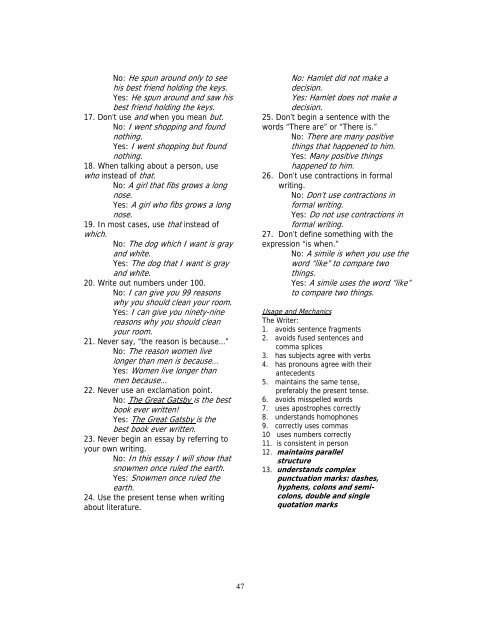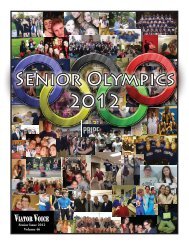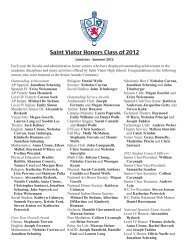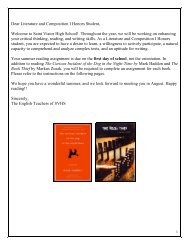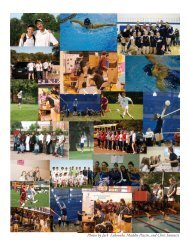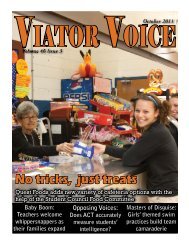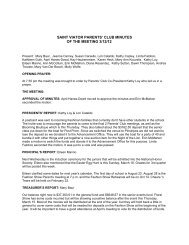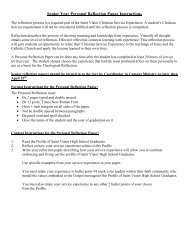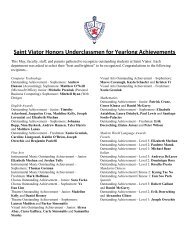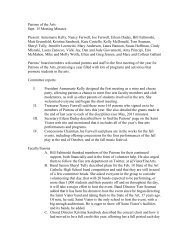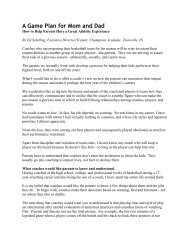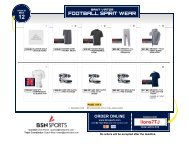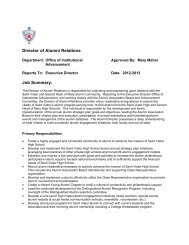Saint Viator High School
Saint Viator High School
Saint Viator High School
You also want an ePaper? Increase the reach of your titles
YUMPU automatically turns print PDFs into web optimized ePapers that Google loves.
No: He spun around only to see<br />
his best friend holding the keys.<br />
Yes: He spun around and saw his<br />
best friend holding the keys.<br />
17. Don’t use and when you mean but.<br />
No: I went shopping and found<br />
nothing.<br />
Yes: I went shopping but found<br />
nothing.<br />
18. When talking about a person, use<br />
who instead of that.<br />
No: A girl that fibs grows a long<br />
nose.<br />
Yes: A girl who fibs grows a long<br />
nose.<br />
19. In most cases, use that instead of<br />
which.<br />
No: The dog which I want is gray<br />
and white.<br />
Yes: The dog that I want is gray<br />
and white.<br />
20. Write out numbers under 100.<br />
No: I can give you 99 reasons<br />
why you should clean your room.<br />
Yes: I can give you ninety-nine<br />
reasons why you should clean<br />
your room.<br />
21. Never say, “the reason is because…”<br />
No: The reason women live<br />
longer than men is because…<br />
Yes: Women live longer than<br />
men because…<br />
22. Never use an exclamation point.<br />
No: The Great Gatsby is the best<br />
book ever written!<br />
Yes: The Great Gatsby is the<br />
best book ever written.<br />
23. Never begin an essay by referring to<br />
your own writing.<br />
No: In this essay I will show that<br />
snowmen once ruled the earth.<br />
Yes: Snowmen once ruled the<br />
earth.<br />
24. Use the present tense when writing<br />
about literature.<br />
No: Hamlet did not make a<br />
decision.<br />
Yes: Hamlet does not make a<br />
decision.<br />
25. Don’t begin a sentence with the<br />
words “There are” or “There is.”<br />
No: There are many positive<br />
things that happened to him.<br />
Yes: Many positive things<br />
happened to him.<br />
26. Don’t use contractions in formal<br />
writing.<br />
No: Don’t use contractions in<br />
formal writing.<br />
Yes: Do not use contractions in<br />
formal writing.<br />
27. Don’t define something with the<br />
expression “is when.”<br />
No: A simile is when you use the<br />
word “like” to compare two<br />
things.<br />
Yes: A simile uses the word “like”<br />
to compare two things.<br />
Usage and Mechanics<br />
The Writer:<br />
1. avoids sentence fragments<br />
2. avoids fused sentences and<br />
comma splices<br />
3. has subjects agree with verbs<br />
4. has pronouns agree with their<br />
antecedents<br />
5. maintains the same tense,<br />
preferably the present tense.<br />
6. avoids misspelled words<br />
7. uses apostrophes correctly<br />
8. understands homophones<br />
9. correctly uses commas<br />
10 uses numbers correctly<br />
11. is consistent in person<br />
12. maintains parallel<br />
structure<br />
13. understands complex<br />
punctuation marks: dashes,<br />
hyphens, colons and semicolons,<br />
double and single<br />
quotation marks<br />
47


